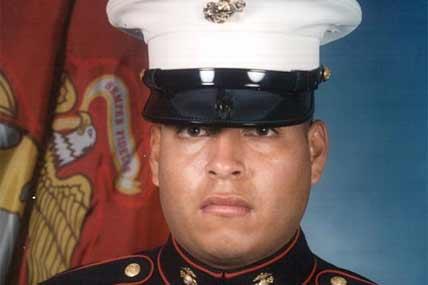It's been eight years since the enemy grenade snuffed out Marine Sgt. Rafael Peralta's life during the battle of Fallujah. The scout team leader had already suffered a bullet wound to the head when he consciously smothered the grenade and absorbed the blast, according to witnesses who credit Peralta with saving a roomful of his fellow Marines.
But the accounts of Peralta's sacrifice are not enough to earn him the nation's highest award for valor, the Medal of Honor, a second Defense Department investigation has concluded.
Defense Secretary Leon Panetta ruled on Dec. 12 that Peralta should receive the Navy Cross instead, supporting the original 2008 findings of his predecessor, Defense Secretary Robert Gates.
Panetta's decision has frustrated Rep. Duncan Hunter, who pushed the Pentagon to re-investigate Peralta's case earlier this year after he obtained a video of the battle action and a newly-released report by a forensic pathologist that the lawmaker says proves Peralta was conscious and his actions intentional.
"I am beyond disappointed," Hunter wrote in a Dec. 13 statement. "Sergeant Peralta is a hero. He died in service to his country and he died protecting his fellow Marines."
This latest struggle over a Medal of Honor decision illustrates the public's festering dissatisfaction that has existed throughout the war with the Pentagon's reluctance to award this prestigious valor award.
The Pentagon has awarded 10 Medals of Honor over the last decade of war. Veterans groups, family members and lawmakers argue that the bravery displayed in Iraq and Afghanistan is no different from past warzones such as the Vietnam War, a conflict that yielded 248 Medals of Honor, according to the Iraq and Afghanistan Veterans of America.
In a Dec. 13 letter to Hunter, Panetta said he reviewed the case personally and decided that "there was considerable medical and professional doubt about whether Sgt. Peralta could have performed such actions attributed to him, and whether the grenade exploded underneath him as some have suggested," the letter states.
"The doubts about this come from, among others, the medical examiner who actually performed the autopsy on Sgt. Peralta, from the Armed Forces Medical Examiner and … his board of certified forensic pathologists, and a number of other medical professionals that have looked at this case.
"I cannot, consistent with my responsibilities, disregard this evidence as they cast more than a reasonable doubt on what happened on Nov. 14, 2004. … To abandon the beyond-a-reasonable-doubt standard for the MOH would also be unfair to all others considered for the MOH but whose actions just fell short of this rigorous evidentiary standard."
On the day of the battle, Peralta and his fellow Marines had cleared three houses and part of a fourth house when "insurgents opened fire on the Marines. Sgt. Peralta, hit in the head by friendly fire, dropped to the floor, severely wounded, according to an account of the Nov. 14 battle included in the pathologists report provided by Hunter's office.
An enemy grenade landed near Peralta. "The other Marines in the room were unable to get out. Despite his wounds, Sgt. Peralta was described as reaching for the grenade and pulling it under his body, absorbing the majority of the lethal blast and shrapnel," the report states.
It appears that Peralta was struck by a 5.56mm NATO round that was traveling from left to right and may have been from a ricochet rather than a direct impact, Vincent J.M. Di Maio, M.D., a consultant in forensic pathology, wrote in the report.
Based on the evidence in the case, "and my own experience with head wounds, it is my opinion that, in all medical probability, Sgt. Peralta was not immediately incapacitated by the brain injury and in fact reached for the grenade and pulled it under his body," Di Maio concluded in his report.
Hunter said he appreciated the time Panetta spent on the case, but is still unsettled by the process Gates used to makes his decision.
"For the first and only time on record, Secretary Gates formed a scientific panel consisting of several forensic experts to refute the findings and recommendation of both the Marine Corps and the Navy. Until then, there was absolutely no disagreement that Sergeant Peralta's actions were in the spirit and tradition of the Medal of Honor," Hunter wrote. "Secretary Gates manufactured the doubt -- the same doubt that led Secretary Panetta not to award the Medal of Honor. I also have questions about the legal authority to conduct such a review in accordance to regulations -- something I intend to examine more closely."
Hunter also said that "the new evidence that was reviewed, including the video, as confirmed through multiple sources, was not previously considered. The video, in particular, invalidates Secretary Gates' conclusion that the grenade detonated one to three feet from Sergeant Peralta's left leg.
"Also, the pathology report that was submitted identifies multiple distinct irregularities with Secretary Gates' findings, such as a piece of the grenade fuse lodged in Sergeant Peralta's flak jacket, center-mass."
Hunter described both Gates and Panetta's decisions as a "severe injustice."
"The only way to correct this error in judgment is to honor Sergeant Peralta with the award he deserves," Hunter wrote.





























